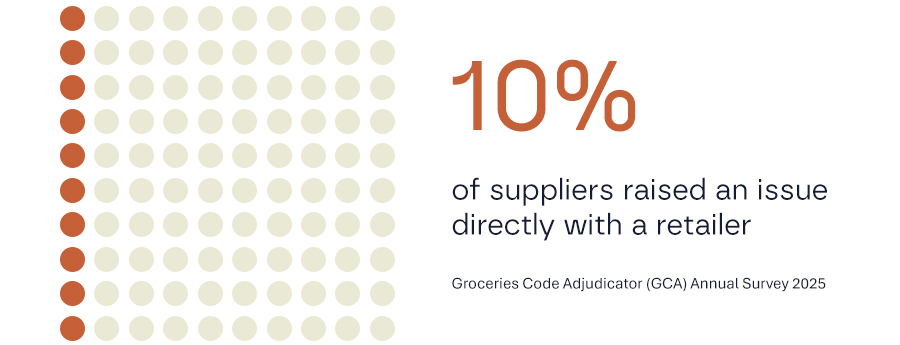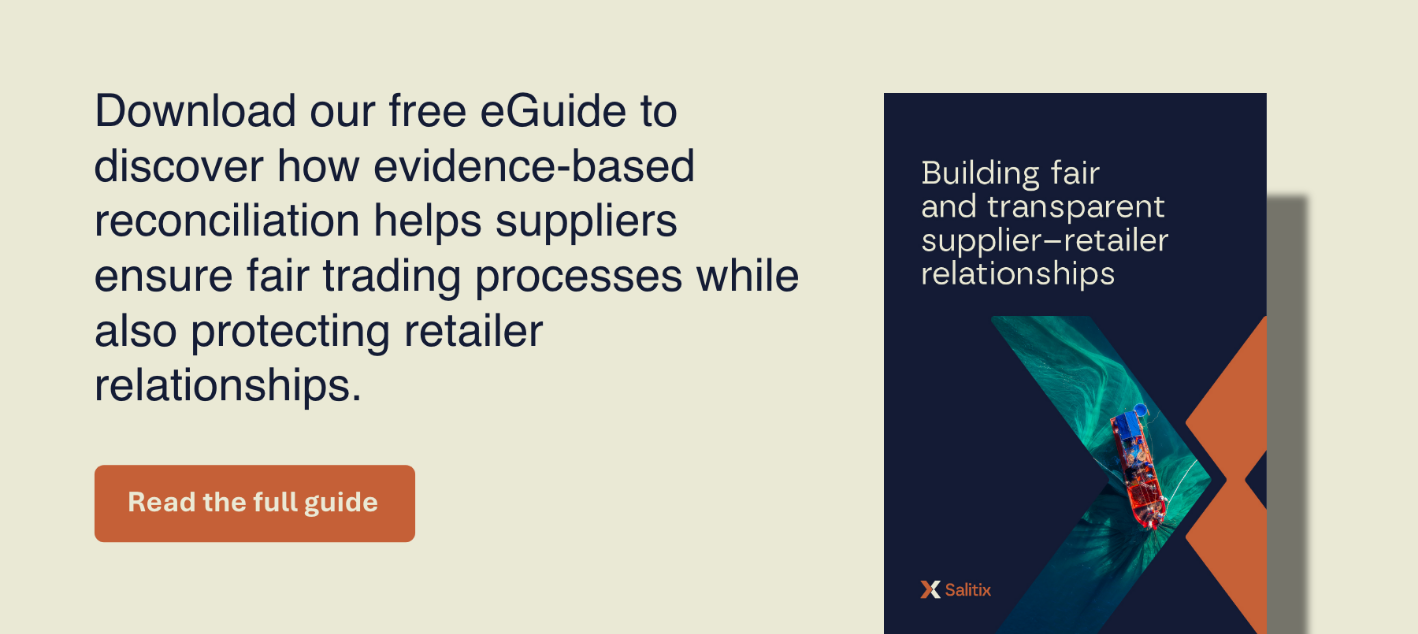Fairness under the spotlight: why suppliers still don’t trust retailer promises
The Groceries Code Adjudicator (GCA) Annual Survey 2025 has reignited a familiar conversation in UK grocery — one about fairness.
The survey’s publication coincides with a number of statements from retailers regarding collaboration and partnership. Asda, for example, recently described its suppliers as “partners for growth” and committed to “always-on communication” as part of its turnaround strategy.
But while the language of partnership sounds positive, the data tells a different story. According to the GCA’s latest findings, many suppliers still don’t feel able to challenge retailers when things go wrong. Fear, frustration, and a lack of trust continue to define relationships that should be built on transparency and mutual value.
The trust gap: what suppliers really think
Despite clear GSCOP protections and the GCA’s visibility — 70% of survey respondents said they had a good or fair idea of the GCA’s role — 36% of suppliers said they wouldn’t raise an issue with the Adjudicator if they believed a Code breach had occurred.
The reasons are telling:
- 38% fear the retailer would find out and there would be consequences for their business
- 18% don’t believe the GCA could make a difference
(Source: YouGov, GCA Annual Conference 2025)
This lack of confidence keeps many suppliers silent — even when they face clear evidence of overcharges, missed payments, or deductions made in error.

The GCA’s research also shows that just 10% of suppliers raised an issue directly with a retailer in the past year, even though more than half experienced potential code-related problems. This is down from 17% in 2015, which could mean one of two things: either retailers are improving and there is less cause for complaints, or suppliers are choosing not to complain because they think it will make no difference (or even harm their commercial relationships).
The reality is simple: the historically unbalanced power dynamic between suppliers and retailers persists, and is arguably becoming more pronounced.
Forecasting and funding — still major flashpoints
So what are the causes of friction between suppliers and retailers? And if the Adjudicator is not the answer, how can this friction be removed?
Forecasting errors continue to be one of the biggest problems. Retailers often issue over-optimistic projections, leaving suppliers with surplus stock and wasted spend when sales underperform.
As one supplier told the GCA survey team:
“There seems to be zero accountability on them to rectify the problem.”
Payment delays and disputed deductions are another recurring theme. Suppliers describe months of back-and-forth, automated systems with no human response, and limited access to independent verification. One respondent summed it up bluntly:
“Trying to get to an actual human being who can review the evidence is painfully difficult.”
These aren’t isolated experiences — they’re systemic symptoms of a process that’s still too opaque, too one-sided, and too slow to resolve genuine issues.
Although we should applaud retailers willing to work closer with suppliers, we also need to remember that words alone won’t restore trust. Fairness has to be demonstrated through process — not promised through PR.
Fairness without fear: the case for independence
True fairness isn’t emotional — it’s evidence-based. It’s not about trusting that everything’s right; it’s about knowing it is.
That’s why independent, fact-based reconciliation is so powerful. When suppliers work with external specialists such as Salitix, they remove commercial tension from the equation.
That’s because reconciliation happens through finance and audit channels — not the trading dialogue — ensuring that issues are resolved discreetly, based on data, not opinion.
By operating independently, Salitix helps suppliers recover what they’re owed and not overpay for promotions that underperform. In doing so, we also help retailers close the loop on errors without damaging relationships.
Fairness is demonstrated in reality
Suppliers don’t want conflict. Retailers don’t want disruption. Both want accuracy and clarity — and that’s what frictionless profit recovery delivers.
It’s not about confrontation; it’s about confirmation. When reconciliation is handled independently, small discrepancies stay small, trust isn’t tested, and both sides can focus on what matters: trading successfully.
Because in the end, fairness shouldn’t be an act of faith — it should be the outcome of a process that works for everyone.



